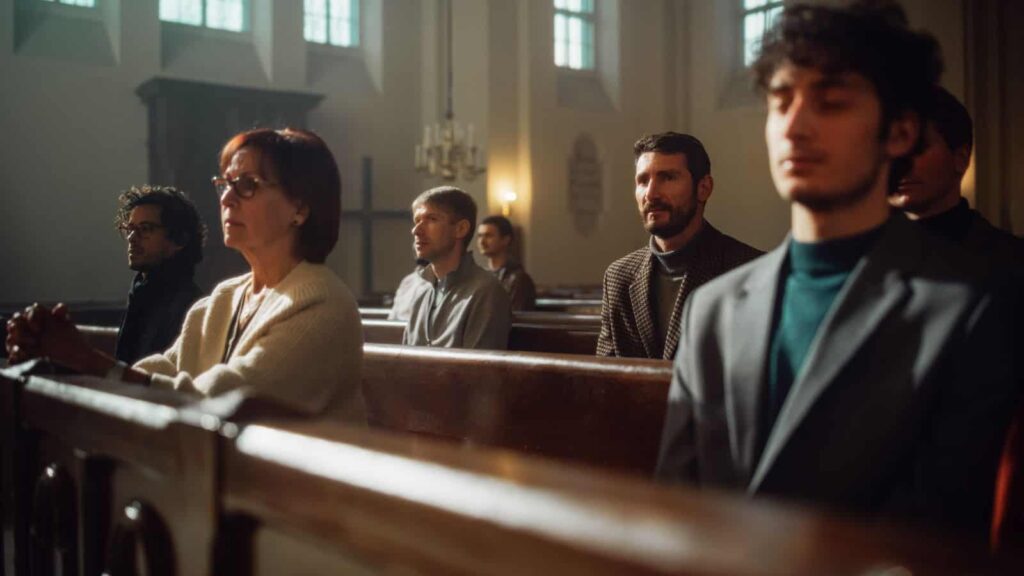If you’re religious, engaging in certain ‘sinful’ activities might be against your principles, but what if your idea of which activities are forbidden is wrong? Most Christians use the Bible as a moral reference point, yet many so-called ‘sins’ aren’t explicitly prohibited in this religious text. Let’s look at 18 acts you can relax and engage in without fearing eternal damnation.
Dancing

Dancing is one of life’s great joys; even innocent infants engage in it! The Bible never condemns dancing as a sin itself and even mentions instances where dancing is used for celebration and praise (Psalm 150:4). Although immoral or lustful dancing (like a strip-tease show) might be a tad more problematic, don’t deny yourself a joyful boogie now and then.
Playing Cards

As with dancing, it’s not the cards themselves that are sinful but their potential for ulterior uses, like betting on blackjack, poker, and other gambling games. According to The Clinton Herald, innocent card plating is permitted—including solitaire, friendly games, and magic tricks. The misconception comes from historical bans on card-playing to prevent gambling and associated violence.
Drinking Alcohol

The Bible acknowledges wine as an acceptable beverage and references it frequently, even as a symbolic part of certain religious rituals. Moderate alcohol consumption is allowed according to the Bible, although drunkenness and alcoholism are clearly condemned. This is because they can harm others and lead to further ‘sinful’ activities.
Unhealthy Foods

Any dietary restrictions in the Old Testament were merely due to the historical context and availability of local foods in that area at that time. While eating unhealthy modern foods like burgers, fries, candy, and ice cream might be bad for your health, religious texts don’t forbid them. The Bible emphasizes freedom in Christ, stating, “Nothing is unclean in itself” (Romans 14:14).
Fashionable Clothing

The Bible does request modesty and decency in attire, but there are no specific rules about clothing style beyond that. So long as you’ve got your more private parts covered and no fabric is too see-through, feel free to express yourself and indulge in whatever fashion trends make you feel good in your own skin. Just because clothing is modern doesn’t mean it’s sinful!
Celebrating Holidays

Country Living states, “There is no Biblical response to Halloween specifically,” but the Bible has “a lot to say about death, darkness, and evil.” While some Christians avoid Halloween due to its possible links to satanic rituals and beliefs, the Bible doesn’t technically forbid it. As for other non-religious celebrations (like the Fourth of July), go ahead and enjoy yourself without the guilt.
Watching Movies

If you’re using an almost 2000-year-old text as a guideline for modern living, there are going to be some gray areas. Given that televisions and cinemas didn’t exist back then, of course, there is no mention of them in the Bible specifically or whether they’re sinful. Enjoying a movie isn’t a sin, but you may want to avoid violence, sex, or other content that goes against Christian values.
Dating/Romance

The Bible encourages marriage, but it also celebrates romantic relationships and offers guidance on building a healthy, loving relationship. It even acknowledges being single as a valid state. Romance isn’t sinful so long as you’re not acting immorally and is, in fact, an important part of a successful, long-term partnership—if that’s what you want.
Listening to Certain Music

This one is tricky because the Bible is understandably vague about exactly which modern music genres are sinful and only forbids musical expression that promotes immorality or violence or contradicts one’s faith. So, if you love heavy metal or classic rock, don’t be afraid to indulge—just choose songs with lyrics that don’t glorify things like promiscuity, abuse, drug use, or other sins.
Tattoos/Piercings

There are no specific verses in the Bible directly forbidding tattoos or piercings, yet many Christians still consider them sinful. In truth, Christian writings tend to focus on inner purity rather than external appearances, which means that outer adornments aren’t as important as devoutness and morality. Feel free to get inked; just choose a tattoo that aligns with your faith.
Swearing

According to Crosswalk, it’s not the words themselves that are sinful but the sentiment behind them or their hurtful effects. The Bible says words are neutral, so it’s probably okay to swear in pain or frustration, but you shouldn’t direct vulgar or bad language at another person to demean or intimidate them. Try to keep social interactions respectful, calm, and ‘clean.’
Questioning Beliefs

The Bible explicitly encourages seeking truth and understanding and often tells stories where characters question their faith and wrestle with moral issues during their spiritual journeys. So, don’t be afraid to think critically or independently—an openness to learning and improving one’s understanding is not inherently sinful, so long as it’s done respectfully.
Attending An Alternative Church

What if you have a friend or loved one who belongs to a church of a different denomination? Can you attend without committing a sin? According to the Bible, worshiping God is the most important thing, and forming fellowships with other believers is encouraged. So long as a denomination doesn’t engage in practices that go against your beliefs, it’s okay to join in.
Enjoying Life

The Bible doesn’t advocate for a life devoid of every earthly pleasure and actually encourages finding joy in the simple things. This can involve appreciating God’s creation (nature and wild landscapes) and enjoying recreational activities and leisure. Drunkenness, sex with strangers, and drug use may be off the menu, but that doesn’t mean you can’t enjoy life’s purer pleasures!
Skipping Church

Regular church attendance is considered beneficial for spiritual growth and community spirit, but failing to attend every Sunday isn’t an explicit sin, so far as the Bible is concerned. You won’t be smitten by God or punished somehow for taking a week off! True faith is reflected in a consistent desire to connect with God and a willingness to be part of the Christian community.
Having Doubts

The Bible promotes truth-seeking and enlightenment, so don’t feel ashamed if you have doubts about your faith. Evidence Unseen says, “While unbelief is certainly sinful, doubt is not.” So long as you’re respectful, doubts or reservations are perfectly allowed and especially understandable in stricter denominations that are more restrictive than the Bible alone.
Mental Health Issues

Suppose you suffer from depression, anxiety, or other mental health issues. In that case, it isn’t a sin to admit this or seek help—such challenges aren’t a sin or a sign of spiritual weakness. The Bible emphasizes seeking help and support when facing difficult times and preaches compassion, so make sure you prioritize your well-being and utilize all sources of support, both medical and spiritual.
Making Mistakes

One of the most crucial tenets of Christianity is forgiveness and grace, so don’t worry if you make mistakes or have to apologize for your actions. So long as you take responsibility, learn from your errors, and attempt to do better next time, you will be forgiven. That doesn’t mean you have ‘carte blanche’ to be as sinful as possible, though! There are limits to repentance.
Up Next: 18 Worrying Facts About Life in Medieval Times

The Middle Ages, also known as the medieval period, lasted from 500 AD to 1500 AD and is usually subdivided into the Early, High, and Late Middle Ages. Life in the medieval period was often brutal, with gruesome punishments, wars, and plagues. Here are 18 terrifying facts about life in the medieval period.
18 Worrying Facts About Life in Medieval Times
19 Easy Ways to Fall Back Asleep After Waking Up in the Middle of the Night

We’ve all been there—it’s dark, quiet, and you’re tired, but you’re still constantly tossing and turning, only to finally fall asleep minutes before the alarm goes off! Waking up throughout the night isn’t just frustrating; it also seriously impacts your energy levels. This article focuses on 19 scientifically proven methods that may help you drift back off more easily.
19 Easy Ways to Fall Back Asleep After Waking Up in the Middle of the Night
17 Things That Are Too Woke For Boomers

Our society is so different from what it was decades ago, and boomers don’t like much of what everyone considers normal in today’s society. In this light, here are 17 things about ‘woke culture’ that particularly make boomers uncomfortable.

